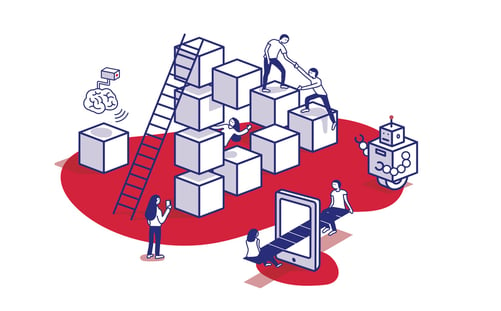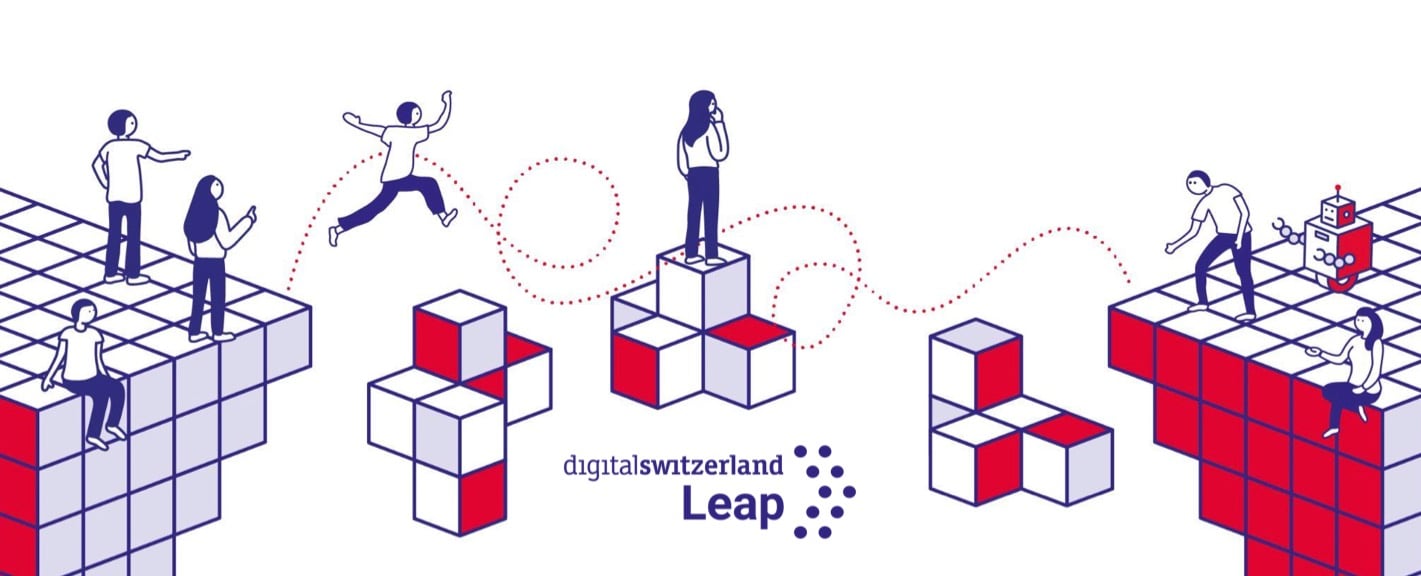Use Case Overview: Digital Municipal Government Workshop in June 2021
Quick Navigation
#0 Introduction and Next Steps
#1 Developing privacy-preserving 'communication spaces' for community activities
#2 Launching a best-practice exchange between municipal governments
#3 Creating digital twins of municipalities as a foundation for additional services

***
With Leap - the platform for multi-stakeholder innovation in Switzerland - and with the support of eGov and MyniGmeind, we conducted a Digital Infrastructure Workshop focusing on Digital Municipal Government. The goal was to understand what data-sharing alliances could be pursued together. Therein, we've focused our collective brainpower to answer the following question:
How might we collaborate to digitally enhance municipalities?
The workshops resulted in three promising ideas for collaborative projects, which we've summarised for you. Below, you get detailed information on each use case and at the end of this page, you can express your interest in having an initial exchange. Thank you for bearing with us while we gather all your interests to find common focus.
In the interim, please feel free to check out the 2021 Swiss Survey on the Digitisation in Municipalities, which further highlights the opportunities for collaborative innovation in this area.
Learn more about Leap by visiting our website or reach out to us at leap@digitalswitzerland.com.
We look forward to deep dive into the use cases with you!
***
Use Case #1:
Developing privacy-preserving 'communication spaces' for community activities
“How might we empower citizens to communicate better and safer in diverse community activities?”
Transversal Problem: The civil life of Swiss citizens is marked by a multitude of interactions with its local community. This may include involvement in the sports club (e.g. tennis or soccer), participation in a leisure activity (e.g. music group), or engagement with local activities (e.g. market). Interactions with all these community activities presupposes communication channels for coordination. For instance, a soccer club may have a Whatsapp chat for the entire team to organise their matches and training. Herein lies the transversal problem that Swiss citizens face. In part due the recent privacy changes of popular messaging platforms (e.g. Whatsapp 2021 Privacy Update), it’s more difficult for groups to agree on communication channels. For instance, it’s not uncommon for recreational teachers, instructors or tutors to communicate with the parents of their cohort over several channels, including e-mail, Signal, Whatsapp and Telegram (depending on the preference of the parents). This makes communication about community activities an arduous task and severely hinders the information flow.
Collaborative Approach: While there are providers of alternative communication tools, they are usually reserved for only the biggest stakeholder in municipal communities (e.g. Klapp for communication between local school and parents). That said, this pain point is felt across many different and smaller community activities (e.g. music group, tennis team) which collectively make up a considerable portion of civil life. As such, a collaborative approach is required to digitise these privacy-conscious ‘communication spaces’ across all community activities. The 2021 Municipal Survey further highlights the importance of digitisation of such residential services, citing it as a prime area for innovation.
Systemic Impact: These ‘communication spaces’ could markedly improve the communication and coordination of community activities, which would contribute to our digital infrastructure and enhance the quality of living for Swiss citizens.
Do you want to develop privacy-preserving 'communication spaces' with us?
Fill out the form below!
***
Use Case #2:
Launching a best-practice exchange between municipal governments
“How might we better share lessons and digitisation projects from one municipality with another to collectively advance?”
Transversal Problem: In delivering their municipal mandate, the vast majority of local governments are facing similar marco-challenges, including the shift to the new ways of working in communities, the participation of senior citizens, and the implementation of sustainability principles. Despite the similarities in strategic priorities, most municipalities choose to pursue their digitization efforts independently. According to a 2021 survey, only 24% of municipalities launch digitization projects in collaboration with other stakeholders (e.g. municipality, city, canton). The fact that digitisation efforts, presumably aimed at similar outcomes, are happening concurrently amounts to considerable inefficiency. Further, it can be construed as a missed opportunity that the most promising digitisation projects are implemented in isolation despite their potential for replication.
Collaborative Approach: In light of these dispersed efforts, there is considerable potential in harnessing individual efforts for the collective benefit. At present, this best-practice exchange overwhelmingly happens socially among the mayors of municipalities, for instance as part of the monthly digital exchange organised by Myni Gmeind. To further enhance this exchange of best-practices, a collaborative information platform is needed where municipalities can share their most-promising projects, the lessons learned, and requests for support. This platform, combined with the monthly exchange of mayors, could serve as a fruitful foundation for more inter-municipal cooperation. This is particularly important since 58% of municipalities consider themselves as ‘lagging behind’ when it comes to innovation, looking increasingly towards a few pioneering municipalities.
Systemic Impact: An enhanced best-practice exchange between municipalities will reduce the duplication of efforts and enable promising digitisation projects to scale rapidly across Switzerland, and enhance the quality of living for Swiss citizens.
Do you want to launch with us a best-practice exchange between municipal governements?
Fill out the form below!
***
Use Case #3:
Creating digital twins of municipalities as a foundation for additional services
“How might we provide additional local services through a digital twin of the municipalities?”
Transversal Problem: The physical infrastructure of a municipality is at the heart of the local community. Adding a new park, building a new sports stadium, improving the public transport capabilities, granting a new development area or promoting more social housing - these are all questions that involve many stakeholders, have a large financial impact and can shape a community for decades. Today the decision making is long, complex, expensive and carries a lot of uncertainty. Some projects fail to convince the local population and don't pass public voting - others use decades to find the right consensus to be pursued and in the worst case a project fails to deliver on the promise it made. Digitization for the construction and planning aspect ranks 3rd highest in terms of necessity to implement digitization efforts in a recent study by Myni Gmeind. When it comes to infrastructure the survey finds that it is the area that sees the largest need for immediate action.
Collaborative Approach: Digital Twins are digital replicas of the physical world. They can represent a single object such as a park bench and a building or an entire city or municipality with all of its associated data. As such a Digital Twin combines a cm detailed 3D model with data representing traffic, pedestrian movement, sensor data, zoning law, market data and much more. Many stakeholders are involved in the creation of Digital Twins as the underlying data comes from different sources. The result is a common data language and representation for the physical infrastructure of a municipality. Based on this unified data representation an ecosystem of software companies can provide coherent solutions to a wide range of use cases. From answering urban planning questions to evaluating an individual building permit - from monitoring critical infrastructure with real time data to optimal traffic routing - the Digital Twin delivers an objective, transparent and collaborative basis to make decisions.
Systemic Impact: A Digital Twin can have an impact on many areas - but most importantly it delivers a visual representation of the physical world that allows to involve all stakeholders around a common language. Data driven decisions can be communicated in a comprehensible way. A well managed physical infrastructure has a positive impact on all aspects of a community - the environment, the social fabric, the local economy and creates future opportunities.
Do you want to create digital twins of municipalities with us?
Fill out the form below!
***

